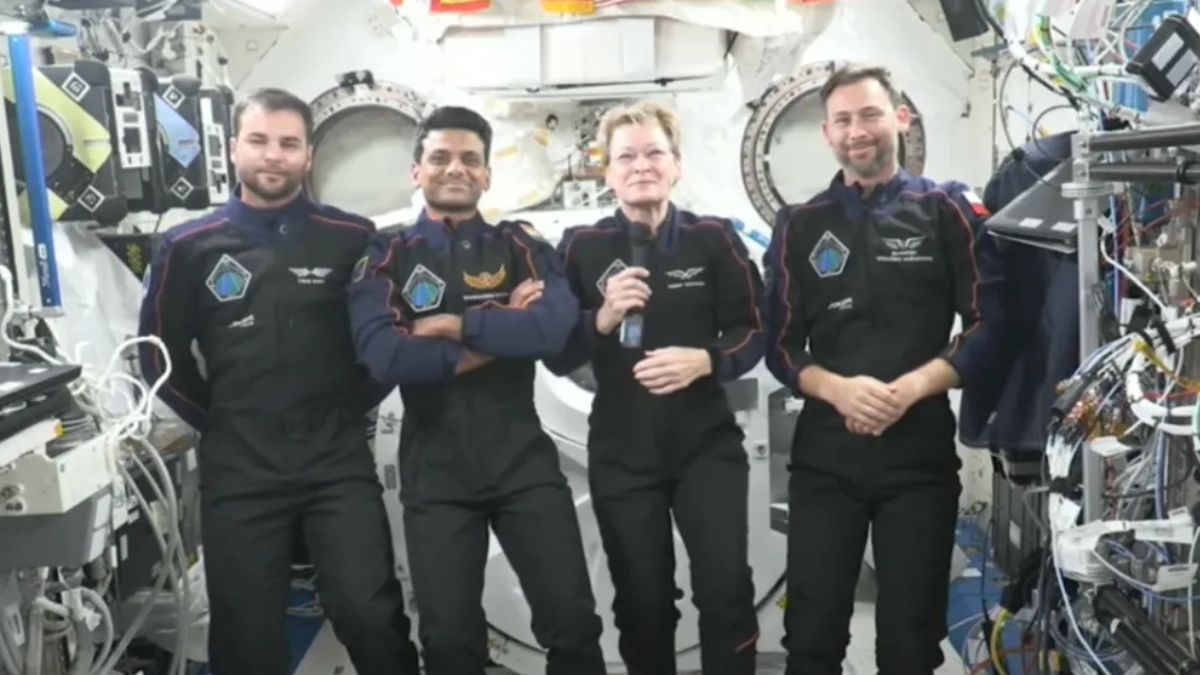Axiom Mission 4: Shubhanshu Shukla's space sojourn extended, crew to return only after July 14
 The Ax-4 crew speak about research on the mission on July 8 2025 [File] | Axiom Space
The Ax-4 crew speak about research on the mission on July 8 2025 [File] | Axiom Space
The return of Group Captain Shubhanshu Shukla and his fellow Axiom Mission 4 (Ax-4) crew members from the International Space Station (ISS) has been delayed beyond the originally planned two-week mission.
According to the European Space Agency (ESA), the crew is now expected to return no earlier than July 14. However, this date is not yet confirmed and is subject to change based on several conditions. Notably, there has been no official confirmation from the Indian Space Research Organisation (ISRO) regarding the return schedule.
The Ax-4 mission began on June 25, when SpaceX's Falcon 9 rocket successfully launched the Dragon spacecraft named Grace, carrying four astronauts—Mission Commander Peggy Whitson, Pilot Shubhanshu Shukla, and Mission Specialists Stawosz Uznański-Wiśniewski and Tibor Kapu. After a 28-hour journey, the capsule docked with the ISS on June 26. Scientific work officially began on June 27, marking the start of their planned 14-day mission.
By the original timeline, the mission was expected to end by July 10. But ESA, in a media advisory, stated that the return of its astronaut Stawosz Uznański-Wiśniewski—and therefore the entire Ax-4 crew—will not take place before July 14. The advisory also noted that this date is provisional and depends on the undocking schedule of the Dragon spacecraft and favourable landing conditions on Earth. The ESA astronaut is expected to return to Cologne, Germany, home of the European Astronaut Centre (EAC), only after the spacecraft's successful return.
"Mission extensions like this are not unusual. Delays often happen due to technical checks, space weather conditions, or the need for safe landing zones on Earth. Past issues such as a liquid oxygen leak in the Falcon 9 rocket and an air leak in the ISS's Zvezda module show how even small problems can lead to changes in schedule," remarked space analyst Girish Linganna.
However, astronauts are mentally and physically prepared for such extensions and prolonged stay in space. Space agencies, including ISRO, NASA, ESA, and Axiom Space, prepare astronauts for a wide range of scenarios—both expected and unexpected.
"Astronauts undergo intense physical and mental training long before they launch. They are taught how to handle emergencies, deal with isolation, manage stress, and stay fit in zero gravity. This makes them mentally strong and physically equipped to handle longer stays aboard the ISS, even beyond their original mission timelines," added Linganna.
The ISS is also well-stocked with essential items to support both short- and long-duration missions. The station carries a steady supply of packaged food, water stored in special containers, and even oxygen generation systems. Backup supplies are also regularly delivered by cargo missions. So even if a mission is extended, the astronauts will continue to have access to all basic needs—including medical support, communication with Earth, and daily exercise routines to maintain muscle and bone strength.
As the Ax-4 crew continues their extended stay aboard the ISS, the world waits for an official return date—and a safe homecoming—for Shubhanshu Shukla and his team, who are carrying out important scientific work and representing a new chapter in international space cooperation.
Sci/Tech